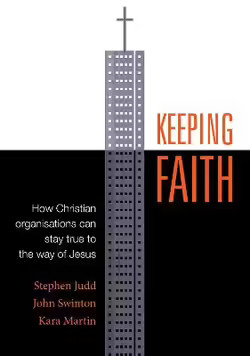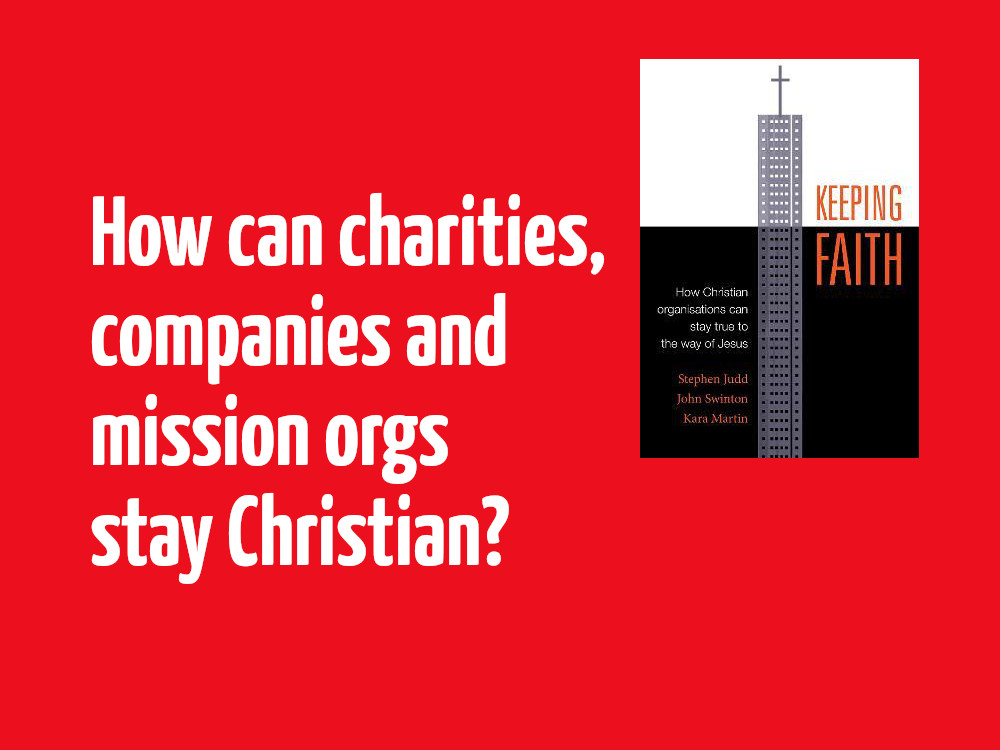By Peter Bentley
A Review of Keeping Faith: How Christian Organisations Can Stay True to the Way of Jesus (2023) by Stephen Judd, John Swinton, Kara Martin.
One could think this is a perennial topic, but it has only had a major focus in the last three decades, with a concentrated re-thinking in the last decade usually under the banner of ‘mission drift.’ This re-thinking has been partly prompted by some high-profile cases where leaders of Christian organisations led in ways that were not true to the way of Jesus.
The earlier examination could be linked to the interest in the 1990s in creating mission and vision statements coupled with codes of ethics. This development arose initially in secular organisations as they sought to maintain a moral foundation while increasingly disassociating themselves from the Christian heritage that had been the foundation of the wider culture and society and indeed often their own organisation.
In prior eras, one assumed that a Christian organisation was simply a Christian organisation even if there were sometimes contradictions. In any case, leaders and staff were more likely to attend church, and it generally seemed okay. In this post Christendom era as the pace of change elucidates and highlights differences, some factors have come to the fore to challenge the Christendom culture of Christian organisations.
- A declining pool of at least cultural Christians to work in Christian organisations.
- The significant increase in size of Christian organisations and thus demand for staff.
- An increasingly indifferent and sometimes hostile environment that has led to internal censorship and a lessening of any overt Christian foundation.
- And as mentioned before, the significant public falls of leaders (and often their organisations)
Simply put, this book has come at an apt time and will help organisations address these issues in the prime context that should have always been part of their daily call and outliving, staying true to the way of Jesus.
Three long-serving leaders pool their experience to provide a call to repentance, renewal, and resilience for this new era of change and challenge. Scottish theologian John Swinton, work and theology specialist Kara Martin, and Stephen Judd, formerly the CEO of HammondCare model a way of collegiate communicating that is to be commended.
This is primarily a study book and provides succinct chapters that build on each other. While it is short, it is dense in an effective way, meaning you need to consider the points to realise it is a very practical theological guide. It is thus not meant to be intellectually digested and put away. I see it is a very complementary book for a board to work through with their CEO or senior staff. It could revolutionise your approach to the normal board agenda. It will help your board and staff to realise that theological knowledge is part of being a Christian organisation. Biblical verses and parables are aptly used to illustrate this point and particular points and all the chapters build on the chapters outlining the concept of a practical organisational theology and creating a Statement of Organisational Theology.
Excellent questions are posed at the end of each chapter. For example:
Do you think that an organisation can be both Christian and an effective business? If it is not possible, why not? (Page 11)
The title chapters alone are often illuminative. For example:
Judgement: you are what you tolerate
Experiencing forgiveness in the workplace
Being a Christian can be risky
I thought it was a timely reminder to recognise that many Christian organisations would not have started if a risk had not been taken (‘risky faithfulness’). Contrast this with some parts of the Christian culture today where risk is neutered by financial and image consideration.
I found the chapter highlighting the nature of sin a helpful reference point. Surely this focus is a distinctive aspect for a Christian organisation. And the discussion about Special Grace and Common Grace is well worth the book alone as it will help you to understand where an organisation, particularly the charities and missions of denominations, are coming from.
How do you balance giving helpful feedback and necessary review? This is a critical area that links to the overall culture of the organisation. There is a balance needed when taking disciplinary action and that does require discernment and wisdom, hallmarks of the work of the Holy Spirit.
The concept of ‘freedom within a framework’ is explained with helpful contemporary examples, with dress code and social media relevant points for today.
There is a good consideration of Spiritual Capital, in the context of Social Capital, something that society could benefit from appreciating, and the church understanding.
Words like forgiveness, redemption, faith, hope, and trust are not ‘Christian speak,’ but cornerstones of the theology that flows through this book.
One point to consider.
This book is oriented towards larger groups and organisations, and I understand this focus in the increasingly public and regulatory environment that faith-based organisations must negotiate. Yet most Christian organisations are small, and voluntary based and it is helpful to consider how volunteers fit in and are addressed in every day faithful living. While not strictly employees, they are vitally important and can impact an organisation in ways quite different to those who are paid.
Lastly, after reflecting further on this book and the helpful stories and biblical references, I keep coming back to the gift of humility and in this context, the need for a Christian organisation to have a culture of humility. From the CEO and Board to the social media coordinator, humility will not only commend you to those you serve, but will also commend you to our Lord.
Further information and articles are available at the publisher Acorn Press:
Peter Bentley is the former National Director for the Assembly of Confessing Congregations.

Keeping Faith: How Christian Organisations Can Stay True to the Way of Jesus Stephen Judd, John Swinton, Kara Martin, Acorn Press $24.99 Available from The Wandering Bookseller
The Other Cheek also wrote about this book: The tough task of keeping Christian organisations Christian

